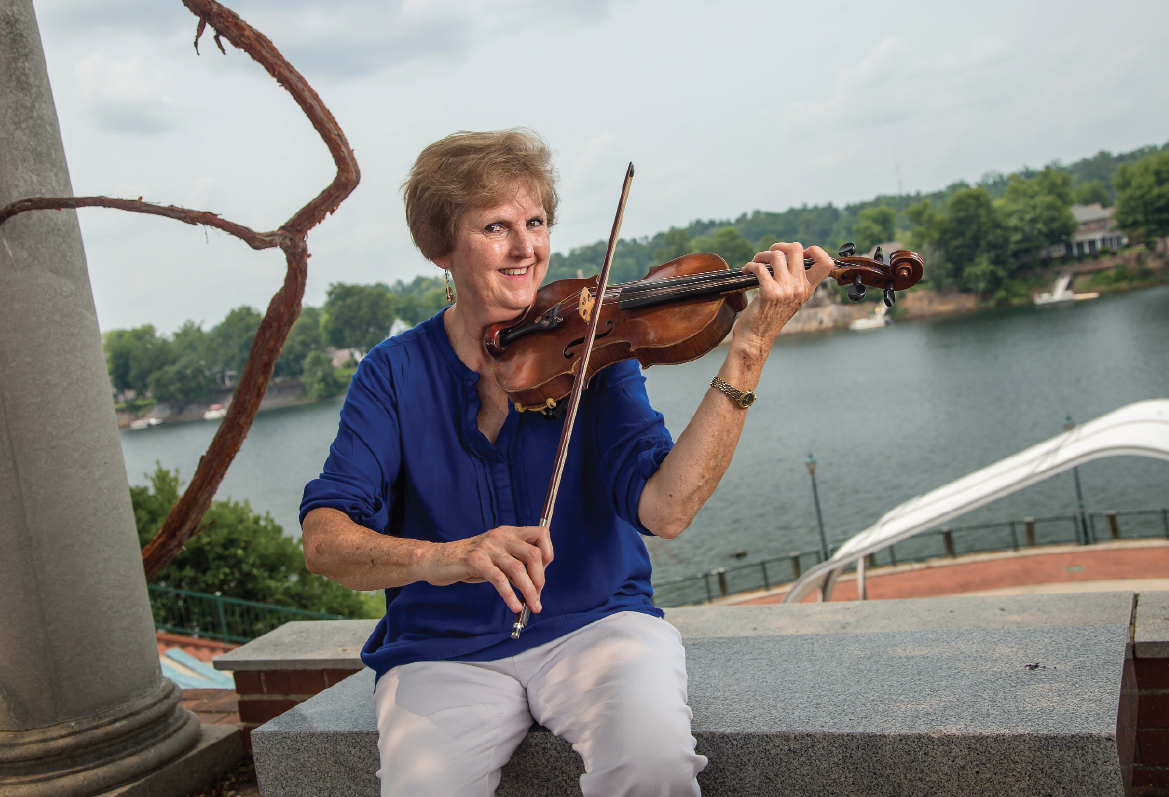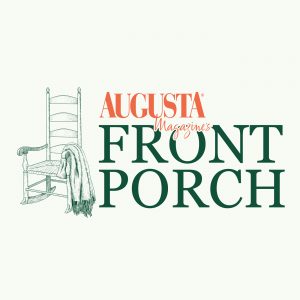Each year, the Greater Augusta Arts Council recognizes outstanding members of the Augusta community for their support and contributions to the arts.
Artist Award
Wycliffe Gordon
OVER A FEW DAYS, a telephone conversation with Wycliffe Gordon might start in Augusta, resume at a Lexington, Ky., band clinic and conclude, perhaps, in Montreal. If you miss him there, you could catch him a week later in the Netherlands or the week after that in Budapest. Or Valencia, Spain.Thank heaven, now that he is artist-in-residence at Georgia Regents University, he’s been slowing down. This past year, in addition to his duties at GRU, he merely performed concerts in Oklahoma, New York, New Jersey, California, Texas, Arizona, Utah, Louisiana, Washington and Portugal, completed residencies with Juilliard and the Louis Armstrong Legacy Project in Chicago…you get the picture.
But between gigs, between flights, between hotel rooms, there’s Augusta. “It’s great to be back home,” says Gordon, at the end of his first year as artist-in-residence at GRU’s Department of Music. “Sitting at my desk in the office, looking out at squirrels and birds in the backyard, there is nothing like it. Quiet, Dorothy said it: ‘There’s no place like home.’”
Born in Waynesboro and raised in Augusta, educated in Richmond County’s public school system, Gordon has gone on to become the world’s preeminent jazz trombone player. After years living in New York City and playing with the likes of Wynton Marsalis, Dizzy Gillespie, Lionel Hampton and the Lincoln Center Jazz Orchestra, Gordon decided it was time to heed Dorothy’s mantra. In fall 2014 his residency at GRU began, but he had already begun giving back to his hometown, funding scholarships, lending musical support to local arts organizations at fundraisers, teaching classes and giving concerts.over a few days, a telephone conversation with Wycliffe Gordon might start in Augusta, resume at a Lexington, Ky., band clinic and conclude, perhaps, in Montreal.
“I have started touring less and I resigned from the Manhattan School of Music. I’ve made a conscious choice to concentrate my educational efforts at GRU. We want to recruit students so that Augusta becomes a destination location for music students.
“Transitioning from MCG to GRU created a bit of an uproar in community. But sometimes you have to stir up what’s in the bottom of the pot to get the good things. We’re now moving to make GRU competitive with major universities.”
As artist-in-residence, Gordon commits six weeks per semester to GRU. He has big plans. “I’ll be building a program leading to a degree in jazz studies. We’re looking to start it for 2015-16.”
“I look forward to being present in the community to do what GRU should do: play the lead role for local high schools and elementary schools, set a standard for students and become a destination location for students both nationally and abroad. We have the makings of it in place.”
President’s Award
Mary Jones
MARY JONES IS PRETTY SURE there’s an artist trapped deep inside her, locked up for the 35 years, nine months and two days she spent as a civil servant, most of them as a civilian employee of the Army at Fort Gordon.
She’ll soon find out. Now two-and-a-half years into her retirement, she plans to take a painting course at the Gertrude Herbert Institute and let that artist out.
But for now, those years as what she calls a “proud Army civilian” have made her exactly what the Greater Augusta Arts Council needs: a secretary who not only manages the City Arts Grant process and takes minutes at meetings, but documents tasks and deadlines to hold the board accountable to
its aspirations.
“Working for the Army requires a very task-oriented, systematic approach to achieving a mission. The artistic self dreams, sees the big picture, but if you say you’re going to do something, set a target, check your progress on the road. That’s how you get done what you say you’re getting done.”
Artists need grounding in mundane practicalities. Jones is an enthusiastic supporter of the GAAC’s Aspirations for Artists program, a series or workshops that teaches business skills to artists. She also likes the GAAC’s plans to educate the community on the arts: workshops on how to buy art, to know what you’re buying—to understand, for instance, different kinds of prints so you don’t get taken advantage of.
Jones joined the Arts Council years ago. In her work life she dealt with issues of diversity as director of equal opportunity and sexual assault programs at Fort Gordon, so she needed to understand more about the cultural mosaic that made up the CSRA. With its Arts in the Heart Festival, the Arts Council seemed an excellent place to connect with all those ethnic and cultural groups. For years now she has organized the Intercultural Parade that is part of the opening ceremony of the annual arts festival.
“Once I got involved with the board, my view broadened. Understanding the purpose of the arts council—to assist artists and organizations—brought me into more contact with more people in the community.”
After retiring, Jones took six months to rest. Then she told Arts Council Executive Director Brenda Durant that she wanted to get more involved. “They welcomed me and put me to work. I dove in. Now I’ve been ‘gainfully volunteered’ for the past year plus.” Next year Jones will be executive vice president of the GAAC board; the year after she will become president.
But that’s down the road. “Right now I’m chompin’ at the bit to find the artist deep down in Mary.”

Sponsor Award
Porter Fleming Foundation
LET’S START IN 1783. On July 31 that year, the Georgia legislature created a board of trustees in Augusta—a town which as had no government of its own yet—to operate a ferry, erect a church, set up a school and sell off property in the 600-acre town common to pay for it all.
The trustees did those things. The school it created, the Academy of Richmond County, still exists; so does the board of trustees itself. Now at 232 years old, the board still holds title to and oversees the Old Richmond Academy and the Old Medical College on Telfair Street.
Porter Fleming, a successful businessman in the cotton trade, was a trustee early in the 20th century. His son Berry became a famous writer. Berry’s Colonel Effingham’s Raid, a satire on Augusta politics, became a national best-seller, a Book-of-the-Month Club selection, and even a 1946 hit movie.
Berry Fleming died in 1989, but he left behind the Porter Fleming Foundation in memory of his father. The Trustees of the Academy of Richmond County serve as advisors to the foundation. Through funds they grant annually, the foundation contributes to “the educational, literary, artistic, scientific, historical, musical and cultural enrichment” of the Augusta area.
“We’re to award grants to individuals or organizations in the humanities that are local, and that are trying to perfect something in their chosen field,” explains Tom Robertson, president of the trustees.
The trustees distribute about $500,000 of foundation money every year. Some goes to individuals working on projects, some to support the cultural life of the area through such organizations as the Harry Jacobs Chamber Music Society, Symphony Orchestra Augusta, the Augusta Chorale, Southern Soul and Song, the Morris Museum of Art and the Gertrude Herbert Institute, Historic Augusta, the Augusta Museum of History, the Richmond County Historical Society, the Porter Fleming Literary Competition and many others.
But Berry Fleming also encouraged the trustees to create new cultural or educational ventures themselves. In that spirit, the trustees came up with the idea of starting an Augusta arts festival, “something like Spoleto, but different,” Robertson says.
And thus was born the Westobou Festival seven years ago. Tweaked each year, the festival continues to grow and flourish, bringing excitement, glamor and vitality to Augusta each fall. This year’s Westobou takes place September 30-October 4.
Westobou’s headquarters— and the venue for many of its performances and exhibitions—is the Old Richmond Academy on Telfair Street, the very structure the trustees built in 1801. Thus, through the Porter Fleming Foundation, the Trustees of the Academy of Richmond County continue to be as relevant to the lives of Augustans as they were 232 years ago.

Media Award
Don Rhodes
A LOVER OF MUSIC, he’s tone deaf; an expert on barrel horse riding, he wouldn’t care if he never had to get on another horse; and though he’s indifferent to sports, he’s an authority on baseball history.
Don Rhodes has written for Morris Communications since he graduated from UGA in 1967 as a reporter, editor, columnist and corporate writer. He has met—and written about—pretty much everyone in and around Augusta—cops, crooks, politicians, musicians, kids, parents, leaders, followers and, increasingly, cowboys. In his “Ramblin’ Rhodes” column, which he has published weekly since 1970, he has profiled almost every country and bluegrass star. And when he’s not writing about music or horses or people for Morris, he’s researching and writing books on his own about famous Augustans, such as James Brown and Ty Cobb.
Rhodes has spent much of his life picking up little nuggets of Augusta history overlooked by others. Then he tells Augusta and the world about how amazing this place is. Ask Rhodes something, then stand back. Stories, facts, incidents pour out in a rush, as if there were barely time to ruffle the surface of that well of information in his head.
“I try to teach people about their history because the more people know, the more pride they feel. When young people see the amazing people who have come out of Augusta, it inspires them to do something amazing with their own lives. Writing, history and music are my passions. When I can combine those three, I’m the happiest.”
Born in Texas, he grew up in Augusta, in South Carolina and in Chamblee, near Atlanta. In high school there, when he couldn’t get into shop class, he took typing.
“That changed my whole life.” Rhodes typed copy for the mimeographed student newspaper and suddenly he had found his vocation. He wrote a gossip column called “The Door Knob” (the door knob sees everything). His classmates didn’t want to be shown in a poor light. “That made people be very nice to me.”
After college at Morris’s Savannah Evening Press one slow Sunday, Rhodes interviewed Minnie Pearl and the course of his life changed. When the Army took Rhodes to Vietnam in 1968, she stayed in touch with him. The lockers of his buddies were decorated with sexy pin-ups; on Rhodes’s hung an autographed picture of a decidedly unsexy woman in a straw hat with a price tag hanging from it. She was his entrée into the world of country music. His “Ramblin’ Rhodes” column has covered country stars in the 45 years since.
Rhodes now is publications editor at Morris, but he still finds a way to research and write about the people who made Augusta’s history so rich.

Volunteer Award
Tricia Hughes
“It was sad,” says her best friend and companion Tricia Hughes, “but her gourd head disintegrated, so we let her die. She’s probably compost now.”
Ima, a painted gourd/scarecrow created by Linda McIntosh, was the silent spokesperson for Sacred Heart’s 2011 Garden Festival. Volunteer Tricia Hughes dressed her up and drove her all over the area to market the festival.
“We set Ima in a French Market basket on wheels. I dressed her in a gardening outfit with a Sacred Heart apron, and I made this hat that had flowers and bees on it, and I would go to every little town and take the posters and take Ima with me. Everybody loved Ima. Ima took drum lessons, Ima went to the Masters, Ima just did everything.”
Bravely and cheerfully, despite Ima’s passing, Hughes has continued to volunteer her services to Augusta arts projects she feels passionate about.
It all started when Hughes and her husband, Peter, were walking down Broad Street one day and they saw a man standing under the marquee of the Miller Theatre. The man was Mike Deas, founder of Friends of the Miller. He gave them a tour and showed them every nook and cranny of the grand old movie place.
Then in 2008, Hughes volunteered to help create the Augusta Photo Festival. She wondered if the Miller might be an exhibition space. Deas said, “Great!” Tricia swept and cleaned and polished away what years of decay she could.”
“Then after the closing of the festival, I thought, I love this building. This would be a great project.”
So she spearheaded the 69th birthday celebration of the Miller in 2009. She helped raise more than $20,000 for restoration with screenings of The Three Faces of Eve and Gone With the Wind. She lobbied tirelessly for SPLOST in 2009, designing T-shirts, purchasing stickers and yard signs, speaking at events and attending every commission meeting.
“I was so driven and fearless, I was passionate.” SPLOST VI passed, with $6.2 million going toward the Miller’s restoration.
Since then, Hughes has volunteered for Westobou, Artists’ Row, Historic Augusta, the Augusta Library, Saturday Market, the Coleman-Leigh-Warren Cemetery and, most recently, First Thursday and the Central Avenue corridor.
“I can’t gift $200 every year to all these organizations I feel strongly about. This is the way I can showcase them, bring new membership and volunteer hours to them.
”I love to see people out enjoying their city. I think Augusta has an awful lot
to offer.”

Arts Professional
Lois Akins
NOT EVERYONE KNOWS THIS, but one of the keys that opens the gate to Disneyworld is the violin.That’s where 43 of Lois Akins’s students serenaded a famous mouse, princesses and visitors in mid-June. It’s just one of scores of performing engagements the students of Suzuki Strings of Augusta play every year.
Since starting the program in 1978, Akins has introduced thousands of students to music and performing. Many of them now direct music themselves in schools and churches, play in orchestras or flourish in non-musical careers, thanks to the self-discipline and confidence they developed as her students. Akins is a “humble but mighty force in the music community in the Augusta region,” says one. She and a staff of seven have more than 160 students.
“Pre-Twinklers” (the beginning students—as young as 3 years old) play cardboard violins until they master skills they need to play a real violin and learn their first tune, “Twinkle, Twinkle, Little Star.” Many students stay on way past Twinkle, playing in increasingly sophisticated ensembles through high school.
Akins started violin herself as a child in Kentucky. With the Central Kentucky Youth Orchestra, she performed at the White House for President Kennedy. After graduating from Georgia College, she taught music at Sego Junior High, then Evans High School in the early ’70s.
She stopped teaching to start her family. Then she learned of something called the Suzuki Method, which enabled children to play a Vivaldi concerto. Kids playing Vivaldi? She attended a Suzuki Institute out of curiosity. She graduated a convert.
“They taught not just an instrument, but the love of music. It wasn’t like my piano teacher who stood over you with a ruler ready to whop you if you made a mistake.”
Children learn language not by reading and learning grammar, but by listening and imitating. Suzuki teaches music the same way. Students begin with listening, then they imitate tunes on their instruments. They don’t learn to read music until later.
Played badly, the violin makes excruciatingly painful sounds. Akins’s mother asked, “How do you stand to listen to all that squeaking?” “Mother,” she answered indignantly, “my students do not squeak.”
Akins has led Suzuki workshops all over the Southeast. Her annual “Workshops for Strings” drew Suzuki families from miles around.
Now Akins is passing leadership of SSA to her daughter Gwen. However, she still teaches five days a week. “I don’t play like I used to, but I won’t let that interfere with my teaching. I hope I can continue for a long time. It was always just my thing, the love of music, and I wanted to instill that in the children. It just kind of grew and grew.”
This article appears in the August-September 2015 issue of Augusta Magazine.







